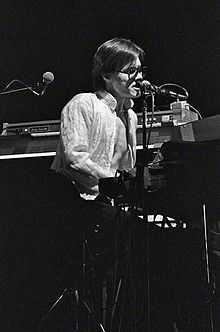Roger Powell (musician)
| Roger Powell | |
|---|---|
 Powell performing at a concert in Arcosanti with Utopia, 1978 | |
| Background information | |
| Birth name | Roger Powell |
| Born | 14 March 1949 |
| Genres | Rock, Electronic |
| Occupations | Musician, Sound Engineer, Programmer |
| Instruments | Vocals, synthesizer, keyboards, trumpet, guitar |
| Years active | 1973–present |
| Labels | Bearsville, Inner Knot |
| Associated acts | Utopia, Todd Rundgren |
| Website | Roger Powell official website |
Roger Powell[1] (born March 14, 1949) is a musician, computer programmer and magazine columnist best known for his membership with the rock band Utopia.
Career
Musician
Powell's musical career started in the late 1960s, programming analog synthesizers for commercials.[2] Powell was the protégé of Robert Moog (who created the Moog synthesizer), as well as Moog's competitor ARP, contributing designs and demonstrating systems.[3]
Powell played keyboards and synthesizers with the rock band Utopia, led by Todd Rundgren and featuring players Kasim Sulton and Willie Wilcox, among others, from 1974 until its disbanding in 1985, playing, writing, and singing on ten of the band's eleven albums. For Utopia's live shows, Powell created the Powell Probe; the first remote, hand-held polyphonic synthesizer controller, which featured a custom-made shell used to access a complex stack of sequencers and other peripherals offstage,[4] a device also used in a modified form by Jan Hammer.[5]
His first solo album Cosmic Furnace was released in 1973 and described by Billboard magazine's reviewer as "...a fascinating, demanding LP that has all the hypnotic eeriness of the recent Miles Davis approach".[6] He produced several additional solo albums, and was a touring musician with David Bowie[7] and others.
In October 2006, after a long absence from music recording, Roger released Fossil Poets[8] with musicians Gary Tanin and Greg Koch.[9] The music is described as electronic / prog rock 'retro-futuristic'.[10]
In March 2009, Roger released Blue Note Ridge with producer Gary Tanin. The music is described as solo piano improvisations.[11] He occasionally performs with Bay Area folk musician and friend David Elias, plus other local, roots musicians. Informal live performances have been hosted and recorded at the San Gregorio General Store.[12]
On September 7, 2009 Powell once again shared the stage with Rundgren as part of a re-constituted Utopia, with Tubes drummer Prairie Prince replacing Willie Wilcox. The band played an opening set for an album-length concert of Rundgren's A Wizard/A True Star. Powell was able to participate in the short tour after leaving Apple and before starting at Electronic Arts.
Programmer
A talented computer programmer, Powell developed one of the first PC MIDI sequencers, Texture. Originally developed for the Apple II, Texture allowed the user to manipulate patterns of notes and store them on disk. Soon after the MIDI protocol was introduced, Texture was ported to the IBM PC and the Amiga [13] and utilized the Roland MPU-401 MIDI interface. Its celebrity users included Stevie Wonder and Bob James. Much of Powell's computer work pre-dated MIDI. He gave the first performance on an all digital synthesizer while working with Hal Alles and Gregory Sims at Bell Laboratories. Powell's talents led eventually to positions with WaveFrame (an "audio mainframe" synthesizer used by Peter Gabriel), Silicon Graphics and Alias/Wavefront.
From 1997 to May 2009, he worked for Apple Computer as a senior programmer and technical lead for audio within Apple Professional Applications. He currently works at Electronic Arts as a Senior Producer on emerging music technologies.
Writer
Powell wrote a Keyboard Magazine column on synthesizer technique for a number of years which were included in several books published by Hal Leonard - Synthesizer Basics,[14] Synthesizer Technique[15] and Synthesizers and Computers[16]
Solo discography
- Cosmic Furnace (Atlantic, 1973 — CD reissue on Wounded Bird, 2005)
- Air Pocket (Bearsville, 1980 — CD reissue w/bonus track on Wounded Bird, 2006)
- Fossil Poets (Inner Knot, 2006 Digipak CD)
- Fossil Poets (Inner Knot, 2007 Ltd. Ed. clear blue vinyl LP)
- Blue Note Ridge (Fossil Poet Records, 2009 CD and digital download)
References
- ↑ Roger Powell official website.
- ↑ Richards, [edited] by David Battino & Kelli (2005). The art of digital music : 56 visionary artists & insiders reveal their creative secrets. San Francisco: Backbeat Books. p. 78. ISBN 978-0-87930-830-8.
- ↑ Jenkins, Mark (2007). Analog synthesizers : understanding, performing, buying: from the legacy of Moog to software synthesis (1st ed. ed.). Amsterdam: Elsevier/Focal Press. p. 60. ISBN 978-0-240-52072-8.
- ↑ "Rolling Stone News". Anchorage Daily News. 12 March 1977. p. 11A.
- ↑ Rideout, Ernie (2010). Synth gods. San Francisco, Calif.: Backbeat. p. 48. ISBN 978-0-87930-999-2. "I'm having an updated version of Roger Powell's Probe built for me"
- ↑ "Album reviews Special Merit picks". Billboard. January 27, 1973. p. 114. Retrieved 11 August 2011.
- ↑ "Bowie Has A Change Since His Sci-Fi Days". The Daily Collegian. 20 October 1978. p. 11A.
- ↑ Fossil Poets official website.
- ↑ Greg Koch official website.
- ↑ "Keyboard Legend Roger Powell Signs with Unicorn Digital and Releases Solo Piano Blue Note Ridge". Hot Indie News. 18 June 2009.
- ↑ "Blue Note Ridge". CD Baby. Retrieved 11 August 2011.
- ↑ "Scot Beynon & Roger Powell et. al.". Eventful. Retrieved 11 August 2011.
- ↑ "Amiga MIDI Tools We Can All Use". 20 October 1978. Retrieved 21 April 2010.
- ↑ Synthesizer basics. Milwaukee, WI: H. Leonard Pub. Corp. 1984. ISBN 0-88188-289-5.
- ↑ Synthesizer technique. Milwaukee, WI: H. Leonard Pub. Corp. 1984. ISBN 0-88188-290-9.
- ↑ Synthesizers and computers (Rev. ed. ed.). Milwaukee, Wis.: H. Leonard Pub. Corp. 1987. ISBN 978-0-88188-716-7.
External links
- Fossil Poets on MySpace
- Roger Powell radio interview on Rundgren Radio
- Roger Powell on Keyboards Special show on Rundgren Radio
| |||||||||||||||||
| ||||||||||||||||||||
|